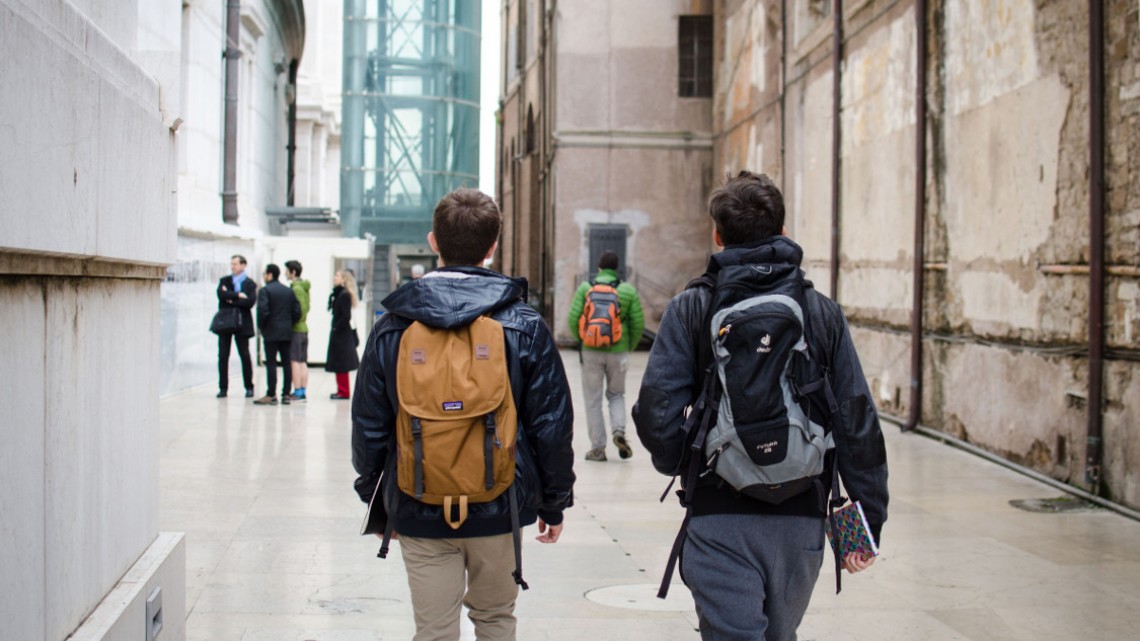
Cornell in Rome students walk to a class visiting the Victor Emmanuel Monument in spring 2017. Cornell in Rome, a program of the College of Architecture, Art and Planning, is among 16 locations worldwide accommodating Cornell’s international students this fall.
Study Away option supports international students
By Daniel Aloi
To support international students, many of whom cannot travel to the United States this fall due to challenges stemming from COVID-19, Cornell is offering them opportunities to live and learn at more than a dozen academic partner institutions worldwide, while taking Cornell classes remotely.
The innovative Study Away option will allow eligible international students to live and study at a college or university in their home country or region, with access to the host institution’s campus facilities and services. Cornell students will be admitted as exchange students, taking a combination of online and in-person classes while sharing co-curricular activities with their Cornell peers and local students.
The initiative is being offered to support international students dealing with ongoing travel restrictions and visa processing delays related to the pandemic.
International students make up 23 percent of the entire student body as well as half of Cornell’s graduate students.
Wendy Wolford, vice provost for international affairs, said that more than 5,700 international students from 115 countries were enrolled in 2019-20. A survey conducted in early May suggested that more than half of the 2,040 respondents, including undergraduate, professional and graduate students, were worried about their ability to travel to New York for the fall semester.
“It’s fair to say we will all be significantly changed by this entire experience,” Wolford said during a July 9 town hall for international students, parents and alumni.
“International students in particular have faced significant and unique difficulties related to their immigration status, and their location far away from this home-away-from-home,” she said, referring to the Ithaca and New York City campuses.
More than 2,100 people from almost 90 countries attended the town hall and submitted nearly 1,500 questions for the panelists.
“As in the past, we’ve been working with legislators and professional associations and our peers to fight for our international students when discriminatory restrictions are imposed,” Wolford said. “As a university, we believe in cross-cultural engagement, academic excellence, inclusion and global leadership, all of which we build with our international students.”
Study Away is “an initiative where we work with some of our best partners around the world who’ve agreed to host a limited number of our students just for the fall semester,” Wolford said. “Although it can’t create a full Cornell experience, it will try to create some Cornell community for those who can’t get back to campus.”
Partner universities include City University of Hong Kong, which recently established Hong Kong’s first veterinary college through a long-term collaboration with Cornell’s College of Veterinary Medicine; VinUniversity, the first private university in Vietnam, founded with academic support from the Cornell SC Johnson College of Business; and China Agricultural University, which hosts a joint degree in food science with the College of Agriculture and Life Sciences.
The College of Architecture, Art and Planning’s Cornell in Rome site will also host Study Away students; and the University of Cantabria, a Cornell Engineering partner in Spain for more than 10 years, will accommodate students from across Cornell this fall. In addition, there are Study Away sites run by private providers such as CET, in Beijing, Shanghai and New Delhi; and in Cali, Colombia.
Students participating in Study Away will take a full load of online classes from Cornell. Advisers from the Office of Global Learning are assisting students in navigating the application process and in choosing partner institutions suitable to their location and educational goals.
Students who take the Study Away option will commit to their chosen location for the entire semester and will be subject to the host university’s official policies and decision-making, as well as local laws, government guidelines and COVID-19 precautions. Wolford’s office is working with Alumni Affairs and Development to build a local alumni support network for students in these regions.
The fall implementation of the Study Away initiative is based on a vision for Global Hubs developed over the past year under Wolford’s leadership.
Located in areas abroad where Cornell students and faculty already work and have strong partnerships, a small number of Global Hubs will deepen connections between teaching and research by building new academic exchanges and study abroad experiences across the university and across borders. Local communities and alumni will be key pieces of each hub.
“In the short term, the global partnerships Cornell has developed are helping to provide support for its international students when they need it most,” Wolford said.
All in-person classes at Cornell will be available remotely for students this fall, Provost Michael Kotlikoff said during the town hall. “We’ve asked faculty to really think about how to make this unfortunate situation as equitable as possible in terms of making sure that students who cannot attend classes get the full benefit,” he said.
In preparation for the fall, faculty and administrators have worked to adapt courses to students across multiple time zones.
“International students are core to what Cornell is,” Kotlikoff said. “We are trying as best we can within the current environment to facilitate your ability to come to Cornell and be the essential part of our educational program that you are.”
Media Contact
Get Cornell news delivered right to your inbox.
Subscribe
